2018年浙江英语高考概要写作真题(2).ppt
- 格式:pdf
- 大小:2.86 MB
- 文档页数:15
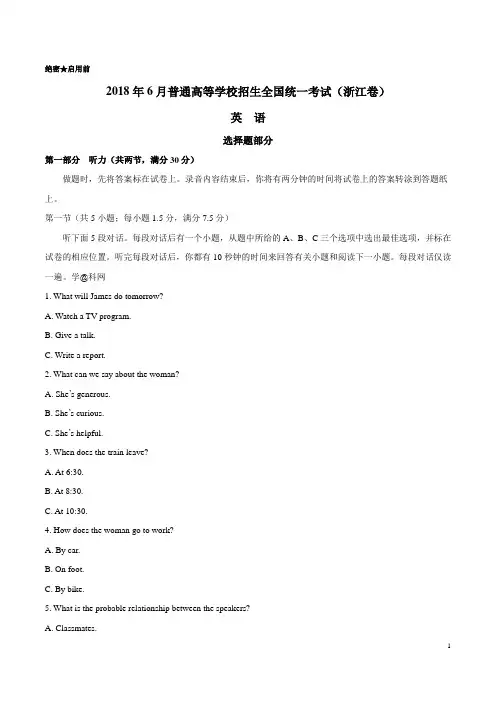
绝密★启用前2018年6月普通高等学校招生全国统一考试(浙江卷)英语选择题部分第一部分听力(共两节,满分30分)做题时,先将答案标在试卷上。
录音内容结束后,你将有两分钟的时间将试卷上的答案转涂到答题纸上。
第一节(共5小题;每小题1.5分,满分7.5分)听下面5段对话。
每段对话后有一个小题,从题中所给的A、B、C三个选项中选出最佳选项,并标在试卷的相应位置。
听完每段对话后,你都有10秒钟的时间来回答有关小题和阅读下一小题。
每段对话仅读一遍。
学@科网1. What will James do tomorrow?A. Watch a TV program.B. Give a talk.C. Write a report.2. What can we say about the woman?A. She’s generous.B. She’s curious.C. She’s helpful.3. When does the train leave?A. At 6:30.B. At 8:30.C. At 10:30.4. How does the woman go to work?A. By car.B. On foot.C. By bike.5. What is the probable relationship between the speakers?A. Classmates.B. Teacher and student.C. Doctor and patient.第二节(共15小题;每小题1.5分,满分22.5分)听下面5段对话或独白。
每段对话或独白后有几个小题,从题中所给的A、B、C三个选项中选出最佳选项,并标在试卷的相应位置。
听每段对话或独白前,你将有时间阅读各个小题,每小题5秒钟;听完后,各小题将给出5秒钟的作答时间。
每段对话或独白读两遍。
听第6段材料,回答第6、7题。
6. What does the woman regret?A. Giving up her research.B. Dropping out of college.C. Changing her major.7. What is the woman interested in studying now?A. Ecology.B. Education.C. Chemistry.听第7段材料,回答第8、9题。
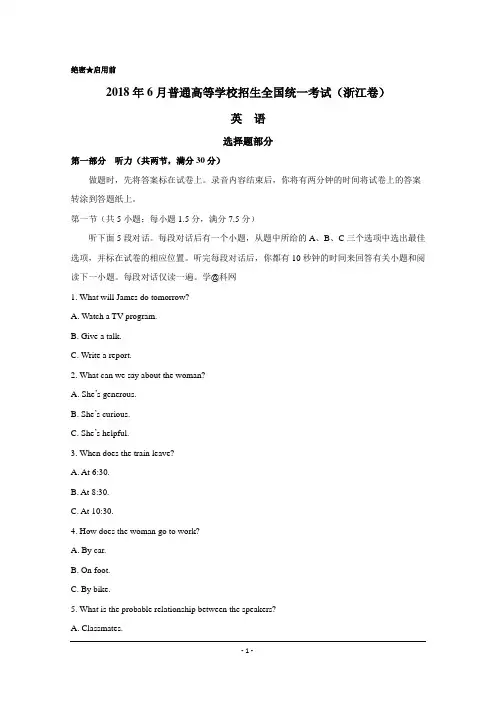
绝密★启用前2018年6月普通高等学校招生全国统一考试(浙江卷)英语选择题部分第一部分听力(共两节,满分30分)做题时,先将答案标在试卷上。
录音内容结束后,你将有两分钟的时间将试卷上的答案转涂到答题纸上。
第一节(共5小题;每小题1.5分,满分7.5分)听下面5段对话。
每段对话后有一个小题,从题中所给的A、B、C三个选项中选出最佳选项,并标在试卷的相应位置。
听完每段对话后,你都有10秒钟的时间来回答有关小题和阅读下一小题。
每段对话仅读一遍。
学@科网1. What will James do tomorrow?A. Watch a TV program.B. Give a talk.C. Write a report.2. What can we say about the woman?A. She’s generous.B. She’s curious.C. She’s helpful.3. When does the train leave?A. At 6:30.B. At 8:30.C. At 10:30.4. How does the woman go to work?A. By car.B. On foot.C. By bike.5. What is the probable relationship between the speakers?A. Classmates.B. Teacher and student.C. Doctor and patient.第二节(共15小题;每小题1.5分,满分22.5分)听下面5段对话或独白。
每段对话或独白后有几个小题,从题中所给的A、B、C三个选项中选出最佳选项,并标在试卷的相应位置。
听每段对话或独白前,你将有时间阅读各个小题,每小题5秒钟;听完后,各小题将给出5秒钟的作答时间。
每段对话或独白读两遍。
听第6段材料,回答第6、7题。
6. What does the woman regret?A. Giving up her research.B. Dropping out of college.C. Changing her major.7. What is the woman interested in studying now?A. Ecology.B. Education.C. Chemistry.听第7段材料,回答第8、9题。
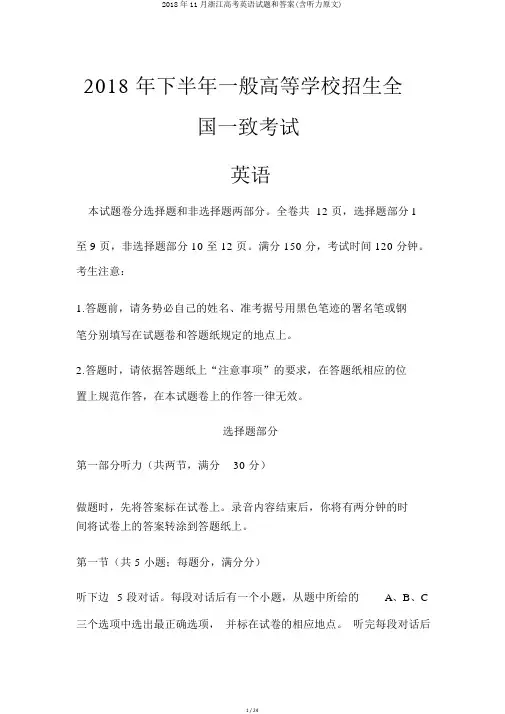
2018 年下半年一般高等学校招生全国一致考试英语本试题卷分选择题和非选择题两部分。
全卷共12 页,选择题部分 1 至 9 页,非选择题部分 10 至 12 页。
满分 150 分,考试时间 120 分钟。
考生注意:1.答题前,请务势必自己的姓名、准考据号用黑色笔迹的署名笔或钢笔分别填写在试题卷和答题纸规定的地点上。
2.答题时,请依据答题纸上“注意事项”的要求,在答题纸相应的位置上规范作答,在本试题卷上的作答一律无效。
选择题部分第一部分听力(共两节,满分30 分)做题时,先将答案标在试卷上。
录音内容结束后,你将有两分钟的时间将试卷上的答案转涂到答题纸上。
第一节(共 5 小题;每题分,满分分)听下边 5 段对话。
每段对话后有一个小题,从题中所给的A、B、C 三个选项中选出最正确选项,并标在试卷的相应地点。
听完每段对话后你都有 10 秒钟的时间往返答相关小题和阅读下一小题。
每段对话仅读一遍。
does the woman want to doTV. for a walk. the Internet.would the woman like to have a Chinese nameis taking a Chinese class.will be working in China.has made some Chinese friends.are the speakers talking abouttravel plan. exam result. sports game.has the man been doingsomething. his pen..does John suggest the woman dohis friend.Harry for help.to the airport with him.第二节(共 15 小题;每题分,满分分)听下边 5 段对话或独白。
每段对话或独白后有几个小题,从题中所给的 A、B、C 三个选项中选出最正确选项,并标在试卷的相应地点。
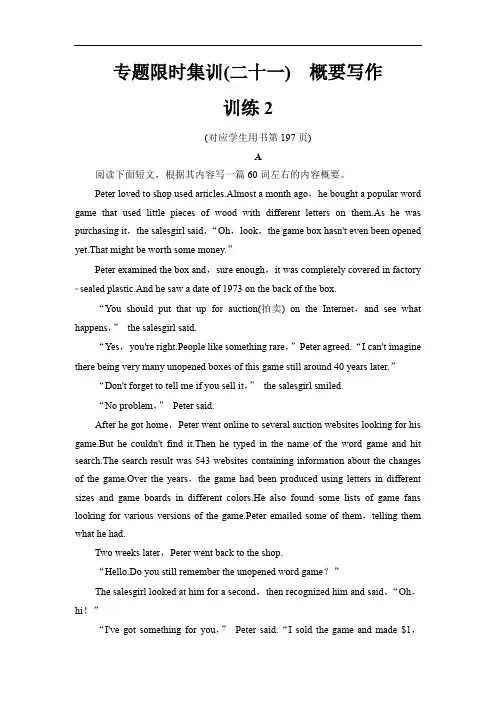
专题限时集训(二十一)概要写作训练2(对应学生用书第197页)A阅读下面短文,根据其内容写一篇60词左右的内容概要。
Peter loved to shop used articles.Almost a month ago,he bought a popular word game that used little pieces of wood with different letters on them.As he was purchasing it,the salesgirl said,“Oh,look,the game box hasn't even been opened yet.That might be worth some money.”Peter examined the box and,sure enough,it was completely covered in factory sealed plastic.And he saw a date of 1973 on the back of the box.“You should put that up for auction(拍卖) on the Internet,and see what happens,”the salesgirl said.“Yes,you're right.People like something rare,”Peter agreed.“I can't imagine there being very many unopened boxes of this game still around 40 years later.”“Don't forget to tell me if you sell it,”the salesgirl smiled.“No problem,”Peter said.After he got home,Peter went online to several auction websites looking for his game.But he couldn't find it.Then he typed in the name of the word game and hit search.The search result was 543 websites containing information about the changes of the game.Over the years,the game had been produced using letters in different sizes and game boards in different colors.He also found some lists of game fans looking for various versions of the game.Peter emailed some of them,telling them what he had.Two weeks later,Peter went back to the shop.“Hello.Do you still remember the unopened word game?”The salesgirl looked at him for a second,then recognized him and said,“Oh,hi!”“I've got something for you,”Peter said.“I sold the game and made $1,000.Thank you for your suggestion.”He handed her three $100 bills.“Wow!”the salesgirl cried out.“Thank you.I never expected it.”【写作指导】通读全文可知,本文属于记叙文。
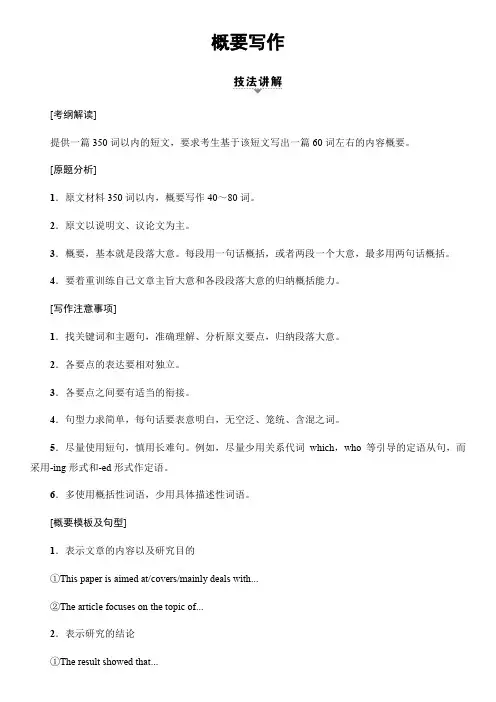
概要写作[考纲解读]提供一篇350词以内的短文,要求考生基于该短文写出一篇60词左右的内容概要。
[原题分析]1.原文材料350词以内,概要写作40~80词。
2.原文以说明文、议论文为主。
3.概要,基本就是段落大意。
每段用一句话概括,或者两段一个大意,最多用两句话概括。
4.要着重训练自己文章主旨大意和各段段落大意的归纳概括能力。
[写作注意事项]1.找关键词和主题句,准确理解、分析原文要点,归纳段落大意。
2.各要点的表达要相对独立。
3.各要点之间要有适当的衔接。
4.句型力求简单,每句话要表意明白,无空泛、笼统、含混之词。
5.尽量使用短句,慎用长难句。
例如,尽量少用关系代词which,who等引导的定语从句,而采用ing形式和ed形式作定语。
6.多使用概括性词语,少用具体描述性词语。
[概要模板及句型]1.表示文章的内容以及研究目的①This paper is aimed at/covers/mainly deals with...②The article focuses on the topic of...2.表示研究的结论①The result showed that...②The author found that...③It was concluded that...3.表示推荐、观点或建议The author suggests/considers that...Suggestions are made for...实战演练1阅读下面短文,根据其内容写一篇60词左右的内容概要。
As most children return to school, many affluent families are choosing to pull their children out of the mainstream education system altogether in favor of having a tutor at home "Around 50 percent of the inquiries we're getting at the moment are for long-term, daily home tutoring," Steve Spriggs, managing director of London-based private tutoring service And, he adds, the trend has grown from families asking for personal tutors to replicate the classroom environment in their own homes. Many families that were making the inquiries for full-time home tutors, Spriggs said, were either travelling so frequently that sending their children to one school was impractical and others did not want their children to go into boarding school.Home tutoring is nothing new, and many tuition firms also offer extra tutoring services to families wanting their children to have a little extra help learning ahead of entrance exams at competitive private schools in the U.K., such as Harrow, St. Pauls or Eton."We always make it clear to parents that we will only offer full-time home schooling for a year though," Spriggs explained. "Any more than a year and children start to lose out on what a school environment can give them, such as social skills and that vital interaction they need – although we try to mitigate that anyway in our home tutoring with sports clubs of museum trips as part of the teaching program."Spriggs said that the costs of hiring a full-time tutor would exceed the fees of a top boarding school, which usually charge around £35,000 ($54,400) a year. Some families employ two full-time tutors, one to cover humanities and the other to cover science and maths. Devising an educational plan for youngsters in these situations is not a quick process, however, taking up to six weeks to plan, Spriggs said, with a tutor being matched to the child to ensure they are compatible.参考范文:Home tutoring isn’t rare in society. Some rich families choose full-time tutors because of frequent travelling or because they don’t want their children to go into boarding school.(要点1) Meanwhile, to perform better in entrance exams, some children need extra tutoring services.(要点2) Some tuition firms add some activities to improve the social skills of the children .(要点3) Although the costs of home tutoring are high, some families still employ two full-time tutors to ensure their children can gain balanced development.(要点4)实战演练2阅读下面短文,根据其内容写一篇60词左右的内容概要。
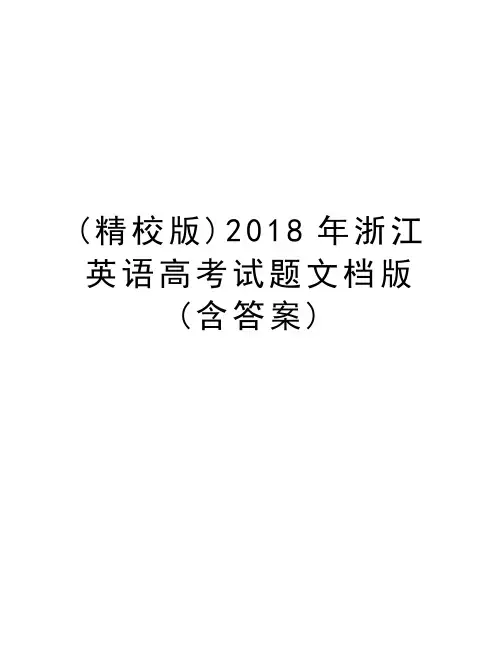
(精校版)2018年浙江英语高考试题文档版(含答案) 绝密★启用前 2018年6月普通高等学校招生全国统一考试(浙江卷)
英 语 选择题部分 第一部分 听力(共两节,满分30分) 做题时,先将答案标在试卷上。录音内容结束后,你将有两分钟的时间将试卷上的答案转涂到答题纸上。 第一节(共5小题;每小题1.5分,满分7.5分) 听下面5段对话。每段对话后有一个小题,从题中所给的A、B、C三个选项中选出最佳选项,并标在试卷的相应位置。听完每段对话后,你都有10秒钟的时间来回答有关小题和阅读下一小题。每段对话仅读一遍。学@科网 1. What will James do tomorrow? A. Watch a TV program. B. Give a talk. C. Write a report. 2. What can we say about the woman? A. She’s generous. B. She’s curious. C. She’s helpful. 3. When does the train leave? A. At 6:30. B. At 8:30. C. At 10:30. 4. How does the woman go to work? A. By car. B. On foot. C. By bike. 5. What is the probable relationship between the speakers? A. Classmates. B. Teacher and student. C. Doctor and patient. 第二节(共15小题;每小题1.5分,满分22.5分) 听下面5段对话或独白。每段对话或独白后有几个小题,从题中所给的A、B、C三个选项中选出最佳选项,并标在试卷的相应位置。听每段对话或独白前,你将有时间阅读各个小题,每小题5秒钟;听完后,各小题将给出5秒钟的作答时间。每段对话或独白读两遍。 听第6段材料,回答第6、7题。 6. What does the woman regret? A. Giving up her research. B. Dropping out of college. C. Changing her major. 7. What is the woman interested in studying now? A. Ecology. B. Education. C. Chemistry. 听第7段材料,回答第8、9题。 8. What is the man? A. A hotel manager. B. A tour guide C. A taxi driver. 9. What is the man doing for the woman? A. Looking for some local foods. B. Showing her around the seaside. C. Offering information about a hotel. 听第8段材料,回答第10至12题。 10. Where does the conversation probably take place? A. In an office. B. At home. C. At a restaurant. 11. What will the speakers do tomorrow evening? A. Go to a concert. B. Visit a friend. C. Work extra hours. 12. Who is Alice going to call? A. Mike. B. Joan. C. Catherine. 听第9段材料,回答第13至16题。 13. Why does the woman meet the man? A. To look at an apartment. B. To deliver some furniture. C. To have a meal together. 14. What does the woman like about the carpet? A. Its color. B. Its design. C. Its quality. 15. What does the man say about the kitchen? A. It’s a good size. B. It’s newly painted. C. It’s adequately equipped. 16. What will the woman most probably do next? A. Go downtown. B. Talk with her friend. C. Make payment. 听第10段材料,回答第17至20题。 17. Who is the speaker probably talking to? A. Movie fans. B. News reporters. C. College students. 18. When did the speaker take English classes? A. Before he left his hometown, B. After he came to America. C. When he was 15 years old. 19. How does the speaker mainly talk about? A. He’s proud. B. He’s sympathetic. C. He’s grateful. 20. What does the speaker mainly talk about? A. How education shaped his life. B. How his language skills improved. C. How he managed his business well. 第二部分 阅读理解(共两节,满分35分) 第一节(共10小题;每小题2.5分,满分25分) 阅读下列短文,从每题所给的A、B、C和D四个选项中,选出最佳选项,并在答题纸上将该项涂黑。 A In 1812, the year Charles Dickens was born, there were 66 novels published in Britain. People had been writing novels for a century—most experts date the first novel to Robinson Crusoe in 1719— but nobody wanted to do it professionally. The steam-powered printing press was still in its early stages; the literacy(识字) rate in England was under 50%. Many works of fiction appeared without the names of the authors, often with something like “By a lady.”Novels, for the most part, were looked upon as silly, immoral, or just plain bad. In 1870, when Dickens died, the world mourned him as its first professional writer and publisher, famous and beloved, who had led an explosion in both the publication of novels and their readership and whose characters — from Oliver Twist to Tiny Tim— were held up as moral touchstones. Today Dickens’ greatness is unchallenged. Removing him from the pantheon(名人堂) of English literature would make about as much sense as the Louvre selling off the Mona Lisa.
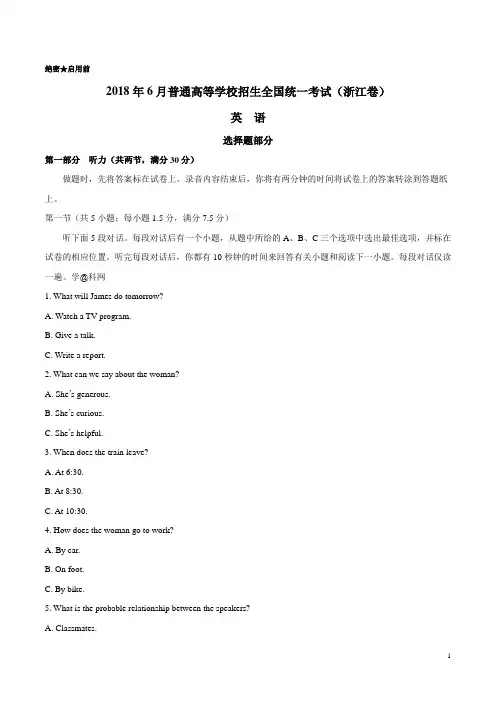
绝密★启用前2018年6月普通高等学校招生全国统一考试(浙江卷)英语选择题部分第一部分听力(共两节,满分30分)做题时,先将答案标在试卷上。
录音内容结束后,你将有两分钟的时间将试卷上的答案转涂到答题纸上。
第一节(共5小题;每小题1.5分,满分7.5分)听下面5段对话。
每段对话后有一个小题,从题中所给的A、B、C三个选项中选出最佳选项,并标在试卷的相应位置。
听完每段对话后,你都有10秒钟的时间来回答有关小题和阅读下一小题。
每段对话仅读一遍。
学@科网1. What will James do tomorrow?A. Watch a TV program.B. Give a talk.C. Write a report.2. What can we say about the woman?A. She’s generous.B. She’s curious.C. She’s helpful.3. When does the train leave?A. At 6:30.B. At 8:30.C. At 10:30.4. How does the woman go to work?A. By car.B. On foot.C. By bike.5. What is the probable relationship between the speakers?A. Classmates.B. Teacher and student.C. Doctor and patient.第二节(共15小题;每小题1.5分,满分22.5分)听下面5段对话或独白。
每段对话或独白后有几个小题,从题中所给的A、B、C三个选项中选出最佳选项,并标在试卷的相应位置。
听每段对话或独白前,你将有时间阅读各个小题,每小题5秒钟;听完后,各小题将给出5秒钟的作答时间。
每段对话或独白读两遍。
听第6段材料,回答第6、7题。
6. What does the woman regret?A. Giving up her research.B. Dropping out of college.C. Changing her major.7. What is the woman interested in studying now?A. Ecology.B. Education.C. Chemistry.听第7段材料,回答第8、9题。